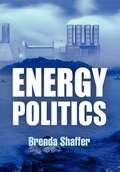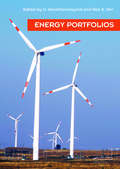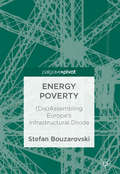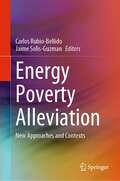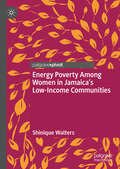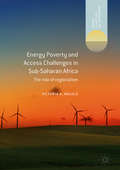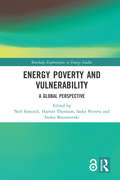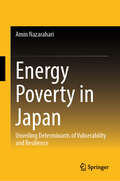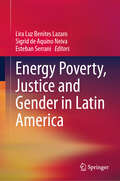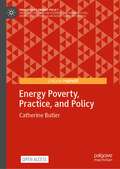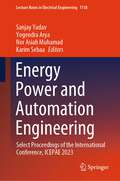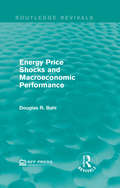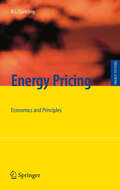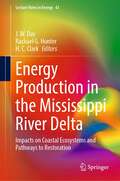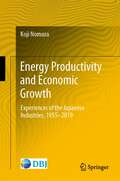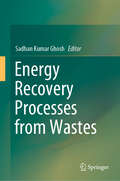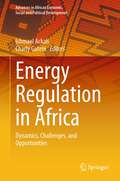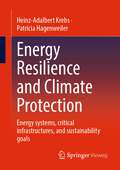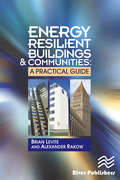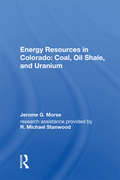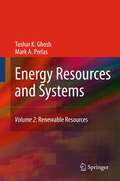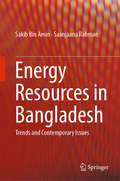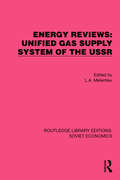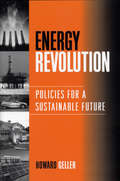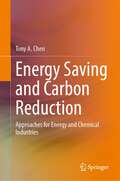- Table View
- List View
Energy Politics
by Brenda ShafferIt is not uncommon to hear states and their leaders criticized for "mixing oil and politics." The U.S.-led Iraq War was criticized as a "war for oil." When energy exporters overtly use energy as a tool to promote their foreign policy goals, Europe and the United States regularly decry the use of energy as a "weapon" rather than accept it as a standard and legitimate tool of diplomacy.In Energy Politics, Brenda Shaffer argues that energy and politics are intrinsically linked. Modern life--from production of goods, to means of travel and entertainment, to methods of waging war--is heavily dependent on access to energy. A country's ability to acquire and use energy supplies crucially determines the state of its economy, its national security, and the quality and sustainability of its environment. Energy supply can serve as a basis for regional cooperation, but at the same time can serve as a source of conflict among energy seekers and between producers and consumers.Shaffer provides a broad introduction to the ways in which energy affects domestic and regional political developments and foreign policy. While previous scholarship has focused primarily on the politics surrounding oil, Shaffer broadens her scope to include the increasingly important role of natural gas and alternative energy sources as well as emerging concerns such as climate change, the global energy divide, and the coordinated international policy-making required to combat them. Energy Politics concludes with examinations of how politics and energy interact in six of the world's largest producers and consumers of energy: Russia, Europe, the United States, China, Iran, and Saudi Arabia.
Energy Portfolios
by U. Aswathanarayana Rao S. DiviThis book provides an overview of the globally ongoing research and development efforts to reduce carbon emissions and costs, and to improve the efficiency of emerging energy technologies. It covers current and future research and development of Coal, Oil, Natural Gas, Nuclear Power, and Renewable Energy Resources. The author provides optimal size,
Energy Poverty
by Stefan BouzarovskiHuman health and well being are closely intertwined with the ability to access affordable and modern domestic energy services, including heating, cooling, lighting, cooking, and information technology. Energy poverty is said to occur when such amenities cannot be secured up to a socially- and physically- necessitated level. Millions of people across the world suffer from energy poverty due to a combination of financial, social and technical circumstances. Energy Poverty and Vulnerability provides novel and critical perspectives on the drivers and consequences of energy-related injustices in the home. Drawing together original research conducted by leading experts, the book offers fresh and innovative insights into the ways in which hitherto unexplored factors such as cultural norms, environmental conditions and household needs combine to shape vulnerability to energy poverty. Case studies from a wide range of countries are presented, thus providing the first globally-integrated account of a policy and research domain that has previously been divided between the Global South and North. An examination of the diverse manifestations of energy poverty is supplemented by an identification of this condition#65533;s shared and context-specific causes. Conveying policy-relevant insights that can inform decision-making, this book can be of great interest to students and scholars of energy demand, social justice, and sustainability transitions, as well as decision-makers and practitioners who wish to find out more about this complex issue.
Energy Poverty Alleviation: New Approaches and Contexts
by Carlos Rubio-Bellido Jaime Solis-GuzmanThis book presents research on energy poverty alleviation, approaching the complex phenomenon topic holistically and with heterogeneity. It includes contributions from research teams studying the topic at a national, regional and local levels worldwide. The book is divided in two main blocks. The first part, New Approaches, involves novel assessments and concepts from a global and multidisciplinary point of view. The second part, Contexts, offers new theoretical diagnoses focused on case studies of different scales from around the world, and concepts for future trends. Energy Poverty Alleviation will be of interest to policy makers, stakeholders, academics and researchers with knowledge in the energy poverty field.
Energy Poverty Among Women in Jamaica’s Low-Income Communities
by Shinique WaltersThis Palgrave Pivot investigates energy poverty in Jamaica, which is a growing problem that affects the mental, physical, and financial health of individuals, families, and communities, and its specific impact on women. Using quantitative and qualitative methods, this study demonstrates the shared relationship between energy development and economic development. It argues that the development of the energy sector has not been a gender-neutral process and has evolved and transitioned within the context of the global political economy, which has been irrevocably shaped and impacted by the lack of government regulation, an increase in efforts at privatization, and the effects of liberalization in terms of the development. Specifically, it shows that more often than not women bear the burden of sourcing, collecting, and using energy for household activities, agriculture, and income-generating tasks. As such, women are affected by energy poverty in many ways, including but not limited to time burdens and drudgery, health issues and physical burdens, as well as the issues that arise due to restrictions on information. This book will be of interest to students and scholars in gender studies, global development, economics, and politics, as well as policymakers and activists dedicated to gender equality and energy justice.
Energy Poverty and Access Challenges in Sub-Saharan Africa: The role of regionalism (Energy, Climate and the Environment)
by Victoria R. NaluleAccess to modern energy is central in addressing the major global challenges of the 21st century, including poverty, climate change and famine. However large parts of the world, especially in Sub-Saharan Africa (SSA) have poor or no access to modern energy. Victoria Nalule argues that SSA countries have many common energy challenges which could be tackled with collective efforts through regional cooperation. By means of a legal and comparative analysis and a seven-step framework, the book explores the current regional mechanisms employed in Africa to address the challenge of energy poverty and access and whether they are effective in tackling the challenge of energy access, including regional energy infrastructure and regional energy regulations.Chapters discuss the evolution of regionalism in SSA and the role of regional cooperation in the development of renewable energy as a means of confronting both energy access and climate change. Specifically the nexus between energy access, renewable energy and climate change is covered as well as the potential of fossil fuels in addressing energy poverty. The establishment and development of regional energy infrastructure as one of the mechanisms of addressing energy access challenges in SSA and regional efforts to harmonise energy regulation are explored. Finally a concluding chapter provides recommendations for policy makers and other relevant stakeholders on how best to implement some of the suggestions made in previous chapters. International organisations, regional organisations, government officials, scholars and students with interest in the energy sector will highly benefit from this book.
Energy Poverty and Vulnerability: A Global Perspective (Routledge Explorations in Energy Studies)
by Stefan Bouzarovski Neil Simcock Harriet Thomson Saska PetrovaHuman health and well being are closely intertwined with the ability to access affordable and modern domestic energy services, including heating, cooling, lighting, cooking, and information technology. Energy poverty is said to occur when such amenities cannot be secured up to a socially- and physically- necessitated level. Millions of people across the world suffer from energy poverty due to a combination of financial, social and technical circumstances. Energy Poverty and Vulnerability provides novel and critical perspectives on the drivers and consequences of energy-related injustices in the home. Drawing together original research conducted by leading experts, the book offers fresh and innovative insights into the ways in which hitherto unexplored factors such as cultural norms, environmental conditions and household needs combine to shape vulnerability to energy poverty. Case studies from a wide range of countries are presented, thus providing the first globally-integrated account of a policy and research domain that has previously been divided between the Global South and North. An examination of the diverse manifestations of energy poverty is supplemented by an identification of this condition’s shared and context-specific causes. Conveying policy-relevant insights that can inform decision-making, this book can be of great interest to students and scholars of energy demand, social justice, and sustainability transitions, as well as decision-makers and practitioners who wish to find out more about this complex issue.
Energy Poverty in Japan: Unveiling Determinants of Vulnerability and Resilience
by Amin NazarahariThis book stands as the first comprehensive exploration of the intricate issue of energy poverty in Japan. Unveiling a nuanced exploration, the book breaks new ground by focusing on a unique category of households vulnerable to energy poverty, a revelation grounded in meticulously gathered, up-to-date data. The book not only dissects the fundamental aspects of energy poverty in Japan in detail, providing a comprehensive review of Japanese studies on energy poverty, but also introduces an innovative methodology for assessing vulnerability at the grassroots level.What distinguishes this work is its timely examination of global events, such as the Russia–Ukraine conflict and the reverberations of the COVID-19 pandemic, and their profound impact on household vulnerability to energy poverty. As the first-of-its-kind analysis in a developed nation such as Japan, the book offers more than insights; it presents pioneering approaches to confront and mitigate energy poverty.Engaging and data-driven, this book serves as an indispensable guide for policymakers, scholars, and those attuned to the urgent need for universal energy access. Enter a world where knowledge meets action, as this book charts a course towards resilience and equitable energy solutions.
Energy Poverty, Justice and Gender in Latin America
by Lira Luz Benites Lazaro Esteban Serrani Sigrid de Aquino NeivaThis book presents a comprehensive examination of the pivotal challenges and viewpoints about energy poverty, energy justice, and gender diversity challenges within the Latin American energy transition context. Notwithstanding the discourse of progress on energy access espoused by some governments, a considerable number of communities in the region continue to lack reliable electricity, thereby emphasizing a glaring disparity in the distribution of benefits and burdens. Through a nuanced and incisive lens, this book explores the complex landscape of inequality and opportunity, emphasizing the urgent need for inclusive action and systemic transformation. The book employs an interdisciplinary methodology, integrating insights from energy policy, social justice, and gender studies to provide a comprehensive analysis of the complex interrelationship between these domains. It examines the intersection between energy poverty and broader social inequalities, particularly gender disparities, and highlights the necessity for solutions that prioritize the most vulnerable communities. By integrating case studies, real-world examples, and expert analysis, the book offers a more nuanced understanding of the barriers and opportunities for progress. The book offers practical policy recommendations and actionable strategies, making it an invaluable resource for policymakers, NGOs, academics, and stakeholders dedicated to fostering an inclusive, sustainable, and just energy transition in Latin America. It encourages readers to reconsider traditional approaches and to advocate for a new vision where energy justice and gender equality are paramount in the region's development.
Energy Poverty, Practice, and Policy (Progressive Energy Policy)
by Catherine ButlerThis Open Access book examines the implications of welfare policy for energy poverty and engages with key conceptual debates at the forefront of energy demand research. Academic work on energy poverty has rarely been brought into conversation with practice-theory-based approaches to energy use and sustainability. This book reveals how novel insights can be made visible through combining these different ways of thinking about energy demand issues. It presents a distinctive approach to energy poverty that places inequalities at the heart of debates about the advancing energy intensity of contemporary societies.
Energy Power and Automation Engineering: Select Proceedings of the International Conference, ICEPAE 2023 (Lecture Notes in Electrical Engineering #1118)
by Sanjay Yadav Yogendra Arya Nor Asiah Muhamad Karim SebaaThis book presents the select proceedings of the 4th International Conference on Energy Power and Automation Engineering, ICEPAE 2023. It focuses on the research of clean energy power, low-carbon technology for power generation, and energy automation technology. The book Enriches understanding by including contributions from leading experts. The book will be useful for researchers and professionals interested in the broad field of power energy.
Energy Price Shocks and Macroeconomic Performance (Routledge Revivals)
by Douglas R. BohiThe oil price shocks of the 1970’s led to severe recessions in the 1980’s in the United States. Originally published in 1989 in the aftermath, Bohi attempts to show both how energy prices can cause a decline in output and employment and to explore important other factors which led to the recessions using the US, United Kingdom, Japan and Germany as examples. The findings in Energy Price Shocks and Macroeconomic Performance have major implications for energy policy and questions government plans which focus solely on preventing another oil supply disruption. This title will be of interest to students of environmental studies and economics as well as professionals.
Energy Pricing: Economics and Principles
by Roger L. ConklingThis book describes the processes through which rates for energy consumption are derived, ranging from initial analyses of the supply and demand parameters to the final forms and levels of end-use consumer prices. The author argues against aggressive accounting procedures, and suggests criteria for choosing firm's position on pending public policy issues. A handbook on energy formulae for non-professionals is included in the book. The author is adjunct professor at the University of Portland.
Energy Production in the Mississippi River Delta: Impacts on Coastal Ecosystems and Pathways to Restoration (Lecture Notes in Energy #43)
by J. W. Day R. G. Hunter H. C. ClarkFor nearly a century, the energy industry had a profound impact on the Mississippi Delta, including both the natural and socio-economic systems. The purpose of this book is to describe the delta, how oil and gas (O&G) activities have impacted both natural and socio-economic systems and how much of the degradation could have been avoided. The Mississippi Delta formed over the past six thousand years but, in less than a century, lost 25 percent of coastal wetlands. O&G activities contributed significantly to this loss. O&G production began in the early 20th century and over 600 conventional fields were developed. Production ramped up rapidly, peaking around 1970, then declined. As O&G production declines, produced water dominates fluid production, and this high salinity brine is laced with a variety of toxins. Often, O&G was produced rapidly and much was left in the ground and is now technically and economically unavailable. With careful planning, this situation could have been avoided. The industry also affected the regulatory framework by weakening regulations, enforcement and impacts were not adequately addressed, and more profits flowed out of state. Thus, the state was economically and environmentally worse off. The industry should be compelled to contribute expertise and financial resources to restoration of the delta.
Energy Productivity and Economic Growth: Experiences of the Japanese Industries, 1955–2019
by Koji NomuraEnergy costs in the economy amount to only a few percent of gross domestic product, but their importance to economic growth is much greater than their apparent number. Energy is used in almost all production and consumption activities, and energy price changes induce significant spillover effects throughout the economic system. More importantly, stable and affordable access to energy is a critical factor in determining the rate of capital accumulation in a domestic economy and, hence, labor productivity growth. The expansion of production per hour worked is achieved by using more and higher quality capital, which requires more energy to operate. This book aims to provide robust observational facts on energy productivity improvement (EPI) and to analyze the mechanisms of EPI achieved in Japan’s economic growth from 1955 to 2019. Linking the productivity account with energy statistics enables us to attempt not only to develop a better indicator of energy productivity but also to evaluate the EPI with other significant changes in the production process, such as capital productivity, labor productivity, and even the overall efficiency measured in terms of total factor productivity. This book is a valuable resource for researchers and policymakers seeking to understand the role of energy throughout the economy and for economic planners seeking to ensure the efficient use of energy now and into the future.
Energy Recovery Processes from Wastes
by Sadhan Kumar GhoshThe book focuses on a global issue—municipal solid waste management (MSWM) and presents the most effective solutions based on energy recovery processes. There is huge potential in employing different technologies and modern management methodology for recovering energy from various waste streams to establish a sustainable and circular economy. In several countries, energy recovery from municipal solid wastes (MSW) is seen as a way of reducing the negative impact of waste on the environment and also reducing the burden on land resources. The book primarily focuses on highlighting the latest insights into energy recovery from various waste streams in different countries, with a particular emphasis on India. Further, it paves the way for sustainability in the energy sector as a whole by addressing waste management issues and simultaneous energy recovery. The chapters present high-quality research papers selected and presented in the conference, IconSWM 2018.
Energy Regulation in Africa: Dynamics, Challenges, and Opportunities (Advances in African Economic, Social and Political Development)
by Ishmael Ackah Charly GateteThis book analyzes the political economy governing energy regulation across the African continent. Presenting case studies that span diverse energy sectors and countries, it provides an overview of their complex political and regulatory frameworks. The book explores emerging technologies and energy markets, highlighting Africa’s preparedness for the energy transition, and sheds light on the pivotal role of cross-border energy trade with regard to energy access. Further, it examines regulators’ influence within regional power pools, as well as their contribution to gender mainstreaming in the energy sector, addressing vital social issues. This book is divided into five parts, the first of which focuses on the political economy of energy regulation. The second part discusses emerging technologies and climate change issues, while the third examines regional energy markets, and regional institutional collaboration. The fourth part features contributions on gender mainstreaming, while part five rounds up the coverage. The book will be of interest to policymakers and investors in Africa, as well as scholars interested in energy regulation and economics.
Energy Resilience and Climate Protection: Energy systems, critical infrastructures, and sustainability goals
by Heinz-Adalbert Krebs Patricia HagenweilerThe increasingly interconnected, fast-moving, unmanageable and unpredictable world brings with it an unprecedented variety of known and as yet unknown challenges and risks. Some of the global risks have a direct impact on critical infrastructures as well as those of energy supply in particular. A high level of functionality of critical infrastructures (CRITIS), which include the sectors of energy, information technology and telecommunications, transportation and traffic, health, water, food, finance and insurance, government and administration, as well as media and culture, is indispensable for a modern industrial society. In the context of the Corona crisis of 2020/2021, the worldwide inadequate preparation for pandemics became obvious, although the probability of epidemic outbreaks and their global spread has increased significantly in recent decades and was thus predictable to a certain extent. Moreover, it has been shown that in a globally interconnected world, complex crisis phenomena can mutually amplify and thus escalate within a short period of time. In particular, the deficits in preparedness for major risks that became apparent in the course of the Corona pandemic cannot be managed by nation states alone, especially since the probability of such events has risen continuously in recent decades and will continue to increase with growing globalization and urbanization and, in particular, as a result of climate change and its consequences. This publication addresses the challenges of energy resilience and climate protection, which will require immense attention in the future.
Energy Resilient Buildings and Communities: A Practical Guide
by Brian Levite Alex RakowThis book is written as a practical guide to those interested in the pursuit of energy resilience at a local scale. Energy resilience is defined as the relative ability of an institution to carry out its mission during a shock to the energy system and approach the concept on the level of a single site occupied by a single community or institution. Examples are drawn from four key community types: military bases, healthcare campuses, educational campuses, and municipal governments. The book then describes a framework for developing an energy resilience plan that applies to each. While the focus is clearly on the United States, understanding the energy resilience threat and conducting long-range energy resilience planning will benefit communities all over the globe. Divided into three main parts, Part One describes the specific energy security threats that are facing local institutions and communities and how an energy shock can affect the mission at each of the four community types and the advantages that each will enjoy in their pursuit of energy resilience. Part Two provides concrete guidance for pursuing energy resilience at a particular institution and allows managers to assess where their institution lies on the energy resilience spectrum and plot a course toward where they would like to be. Part Three describes the three main areas of energy resilience performance: energy efficiency, on-site generation, and emergency planning. Case studies are also provided.
Energy Resources In Colo/h: Coal, Oil Shale And Uranium
by Jerome G. MorseAs the rate of energy use far outstrips the estimate of what resources may be available, other fuels are needed to supplement dwindling supplies of oil and gas. Three such alternatives are coal, oil shale, and uranium, all of which exist in potential abundance in Colorado. However, large-scale production of these resources will result in complex interactions with the state's social and physical environment, and the technologies and issues involved must be fully identified and understood before full-scale development takes place. This book provides current information on coal, oil shale, and uranium resources in the state, as well as on the potential impact of the technology associated with their development. Initially prepared as three separate volumes intended to inform policymakers in the legislative and executive branches of state government, this single volume has been expanded and brought up to date for a broader audience.
Energy Resources and Systems: Renewable Resources
by Mark A. Prelas Tushar K. GhoshThis second volume of Energy Resources and Systems is focused on renewable energy resources. Renewable energy mainly comes from wind, solar, hydropower, geothermal, ocean, bioenergy, ethanol and hydrogen. Each of these energy resources is important and growing. For example, high-head hydroelectric energy is a well established energy resource and already contributes about 20% of the world's electricity. Some countries have significant high-head resources and produce the bulk of their electrical power by this method. However, the bulk of the world's high-head hydroelectric resources have not been exploited, particularly by the underdeveloped countries. Low-head hydroelectric is unexploited and has the potential to be a growth area. Wind energy is the fastest growing of the renewable energy resources for the electricity generation. Solar energy is a popular renewable energy resource. Geothermal energy is viable near volcanic areas. Bioenergy and ethanol have grown in recent years primarily due to changes in public policy meant to encourage its usage. Energy policies stimulated the growth of ethanol, for example, with the unintended side effect of rise in food prices. Hydrogen has been pushed as a transportation fuel. The authors want to provide a comprehensive series of texts on the interlinking of the nature of energy resources, the systems that utilize them, the environmental effects, the socioeconomic impact, the political aspects and governing policies. Volume 1 on Fundamentals and Non Renewable Resources was published in 2009. It blends fundamental concepts with an understanding of the non-renewable resources that dominate today's society. The authors are now working on Volume 3, on nuclear advanced energy resources and nuclear batteries, consists of fusion, space power systems, nuclear energy conversion, nuclear batteries and advanced power, fuel cells and energy storage. Volume 4 will cover environmental effects, remediation and policy. Solutions to providing long term, stable and economical energy is a complex problem, which links social, economical, technical and environmental issues. It is the goal of the four volume Energy Resources and Systems series to tell the whole story and provide the background required by students of energy to understand the complex nature of the problem and the importance of linking social, economical, technical and environmental issues.
Energy Resources in Bangladesh: Trends and Contemporary Issues
by Sakib Bin Amin Saanjaana RahmanThis book discusses the energy issues facing Bangladesh, specifically the lack of access to electricity that impedes overall development. In-depth chapters examine critical energy problems and provide possible solutions including energy conversion and energy efficiency and the utilization of energy reform strategies for further development of the energy sector. This book is useful to students and practitioners seeking a clearer understanding of contemporary energy issues, energy markets and their sustainable development, including modern technologies for energy conversion from as waste and strategies for efficiency. It presents thought-provoking ideas and strategies to help Bangladesh achieve Sustainable Development Goals (SDGs) and transition to an upper-middle income country by 2021, through the utilization of proper energy policies.
Energy Reviews: Unified Gas Supply System of the USSR (Routledge Library Editions: Soviet Economics #6)
by L. A. MelentievEnergy Reviews: Unified Gas Supply System of the USSR (1985) explores some important aspects of the development and operation of the unified gas system of the Soviet Union. It pays particular attention to both the basic characteristics of and the long-term trends in its development and shows how the USSR has solved the problems involved in creating such a system.
Energy Revolution: Policies for a Sustainable Future
by Howard GellerThe transformation from a carbon-based world economy to one based on high efficiency and renewables is a necessary step if human society is to achieve sustainability. But while scientists and researchers have made significant advances in energy efficiency and renewable technologies in recent years, consumers have yet to see dramatic changes in the marketplace--due in large part to government policies and programs that favor the use of fossil fuels.Energy Revolution examines the policy options for mitigating or removing the entrenched advantages held by fossil fuels and speeding the transition to a more sustainable energy future, one based on improved efficiency and a shift to renewable sources such as solar, wind, and bioenergy. The book:examines today's energy patterns and trends and their consequencesdescribes the barriers to a more sustainable energy future and how those barriers can be overcomeprovides ten case studies of integrated strategies that have been effective in different parts of the worldexamines international policies and institutions and recommends ways they could be improvedreviews global trends that suggest that the transition to renewables and increased efficiency is underway and is achievableEnergy policy represents a linchpin for achieving a broader transition to a more sustainable economy. Energy Revolution offers a unique focus on policies and programs, and on the lessons provided by recent experience. It represents a key statement of the available options for reforming energy policy that have proven to be successful, and is an essential work for policymakers, researchers, and anyone concerned with energy and sustainability issues.
Energy Saving and Carbon Reduction: Approaches for Energy and Chemical Industries
by Tony A. ChenThe book provides an integrated energy/exergy analysis method to identify the energy utilization issues and systematically propose the cost-effective energy-saving and CO2 mitigation/capture solution. There is a strong market needs on energy-saving and greenhouse gas (GHG) reduction. CO2 mitigation/capture will achieve economic benefit of fuel, power, and carbon tax saving as well as environmental GHG reduction. The book is a professional book for energy-saving and GHG gas mitigation technology in oil & gas, oil refining, and chemical industry. It is an integrated technical book that combines energy utilization theory and practical method, including: thermodynamic analysis for unit operation and process units; energy and exergy calculation for various process streams and utilities; three-link energy/exergy analysis model; energy/exergy balance of equipment, process units, and entire plant; approach and technology of energy saving; optimization of pipeline and equipment; pinch energy-saving technology and its application; CO2 capture and utilization with 8 case studies incorporated for all different scenarios; key energy-saving technologies such gas turbine, FCCU regeneration CO combustion and energy recovery, flue gas turbine system optimization, low-grade heat recovery and utilization. The book is intended for engineers and professional personnel who are working in process engineering, EPC companies, chemical and petrochemical plants, refineries, oil & gas production facilities, power generation plant. It can also be a professional reference or textbook for undergraduate or graduate-level university students and teaching personnel of chemical, energy, and process engineering faculties of universities.
